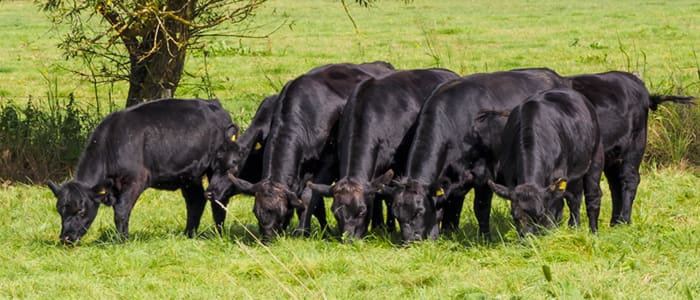Protein & Plant-Based Alternatives

SUSTAINABLE BEEF PRODUCTION
Costco recognizes that beef production has an impact on the environment and, depending upon the beef production practices employed, the impact may be negative, positive, or somewhere in-between. Costco encourages suppliers to support good land stewardship practices. There are concerns that beef production contributes to tropical deforestation in countries such as Argentina, Brazil, Colombia and Paraguay. Our intent is not to source beef from high-risk deforestation regions until comprehensive traceability and monitoring systems are in place. We notified suppliers that Kirkland Signature™ items containing beef should not come from these regions. This includes beef sold in our fresh meat cases. We conduct surveys with our suppliers to confirm compliance.
According to supplier reports for fiscal year 2021, over 88% of the beef in Kirkland Signature items came from the U.S., Canada and New Zealand. We also identified one ground beef item being sold in one region that contained less than 1 percent of Argentine beef. We are working with our supplier to address this issue.
Costco is a member of the U.S. and Canadian Roundtables for Sustainable Beef, with a mission to advance, support, and communicate continuous improvement in the sustainability of U.S. and Canadian beef production by educating and engaging the beef value-chain through a collaborative multi-stakeholder effort.
Costco, in partnership with others in the U.S., is exploring how it can support ranchers to evaluate their management practices with key indicators linked to economic, social, livestock and environmental outcomes. Costco also engages with the Australian Beef Sustainability Framework.
BEEF & THE PRESERVATION OF NATIVE GRASSLANDS
Costco recognizes that one of the greatest threats to native grasslands or prairies is conversion to cropland. We also recognize that responsible beef production can be linked to the preservation of native grasslands in places like the Northern Great Plains (NGP) of the U.S., where the intact grasslands ecosystem is compatible with responsible cattle grazing.
Responsible grazing maintains the health of grasslands, improves soil quality with manure, and preserves open space and wildlife habitat. Additionally, carbon is sequestered in the grasses and soils of grazing lands that are properly managed. Beef production also provides social benefits by sustaining livelihoods and community vibrancy in rural areas where grasslands dominate. Keeping the NGP as grasslands not only helps conserve biodiversity, but it also means cleaner streams, less fertilizer runoff, more pollinators for plants and more carbon stored in the soil.
A key element of the pilot was to increase uptake of technology and monitoring tools or, in cases where useful tools did not exist, identify gaps for ecological monitoring and continuous improvement. The World Wildlife Fund (WWF) partnered with MaiaGrazing, a user-friendly, online grazing management application that helps ranchers maximize economic and environmental sustainability of their operations.
Costco purchased subscriptions of the professional version of the application for ranchers enrolled in the pilot. Throughout 2020, WWF promoted MaiaGrazing as a valuable tool for enrolled ranchers to plan their grazing management and rotations. While the uptake of the tool has been lower than expected, additional efforts are being reviewed to determine its viability.
This program partnership has since concluded and we learned valuable lessons to apply to our future rancher engagements. We continue to look for ways we can help.
PLANT-BASED ALTERNATIVES
Finally, Costco is aware of the need for protein diversification as an additional way to address deforestation and climate change. We continue to grow our selection of plant-based proteins, as an alternative protein offering to our members. Our growth in this area has been dependent upon availability and some examples include Kirkland Signature™ beverages and the Beyond Meat Burger™. In 2021, we have continued to experience an increase in plant-based protein sales.